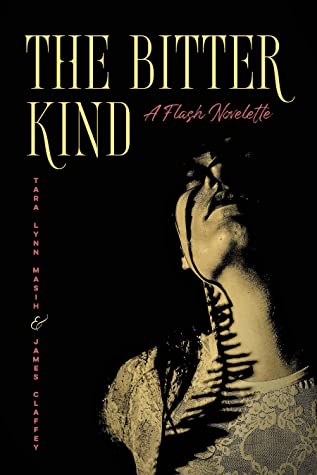The Search for Human Connection: A Review of Masih and Claffey’s ‘The Bitter Kind’
By Allison Wall
Posted on

The spread of COVID-19 has greatly impacted the human experience of 2020 across the world. In addition to our shared illness—and our losses of loved ones, income, and stability—our attempts to combat the virus interrupt our ongoing need and search for human connection. Many of us are feeling painfully isolated. Even in these strange times, though, books continue to provide insight into these particularly human emotions, and they are a source of connection in and of themselves. One such book is The Bitter Kind.
The Bitter Kind by Tara Lynn Masih and James Claffey (Oct. 2020, Červená Barva Press) is a fascinating lyric novelette divided between two alternating points of view: Stela, a survivor of childhood abuse that follows her into a transient adulthood, and Brandy, a Chippewa orphan, a seer, deeply in tune with nature, and a drifter.It’s not immediately clear why we’re following these two characters. They don’t know each other, live hundreds of miles apart, and come from very different backgrounds. But, Stela and Brandy’s narratives are gripping and compulsively readable for totally different reasons.
Stela’s story begins in the violent household of her childhood, in which her alcoholic father terrorizes the family during the day, and Stela at night. She longs to get away and start a new life for herself. Brandy grows up one with the spirit of the Ghost Wolf. He doesn’t always know whether he’s a boy or a wolf, and as he suffers losses, he navigates his life caught between the natural world and the spiritual.
According to Masih and Claffey, The Bitter Kind is an experiment in collaboration. Each point-of-view character had previously appeared in short stories the authors had written individually. Masih is responsible for Brandy, and Claffey for Stela. The integration of their authorial voices is seamless. The prose flows steadily and gracefully. Both authors are known for their contributions to flash fiction, and it shows: even though The Bitter Kind is intended—and works—as a single story, it has the powerful impact of flash fiction. Section by section, important objects and moments are galvanized in the reader’s mind. Each scene holds the weight of the world.
Two authors, two points of view, yet the result isn’t simple dualism, or an overly tidy plot in which Stela and Brandy’s lives parallel each other beat for beat. These are individual and uniquely scarred characters, whole on their own, and beautifully crafted on the page. What Stela and Brandy have in common is the loss or absence of family, isolation, and a deep melancholy. A sense of alienation pervades their stories, from one’s own flesh and blood, from one’s history, from oneself, a sadness that, even if the reader can’t identify with the cause directly, is relatable.
The book reminds me very much of Denis Johnson’s Train Dreams, not necessarily in the plot (though there are references to Train-Dreams-era frontier days), but in the experience. For me, very similar emotions were evoked—melancholia, longing, awareness of the mystical nature of the world—and the same sense of impossibility: how can such a little book hold so much of the human experience? The Bitter Kind is less than 70 pages long.
Stela and Brandy aren’t soulmates. The book isn’t a romance. But, as their needs for human connection go largely unmet or are met with encounters that lead to greater void, their need for each other—for someone—becomes desperate. It’s not clear that they are in sync, or that their lives will ever intersect, but they are both moving, both searching, and the overwhelming question is: Will they find the connection they’re looking for?
This question, too, is deeply relatable. It is one humanity has struggled to answer for ourselves long before the uncertainty of a global pandemic with its death, social distancing, joblessness, and disorientation, before we watched the world unravel, and our existential anxieties compound. Stela and Brandy are living in a pre-COVID-19 world, but through their stories, we know that our feelings of alienation are within the scope of the human experience, and in them can be found great beauty. The Bitter Kind functions as a lightning rod for catharsis. The prose itself offers human connection with Stela and Brandy, Masih and Claffey, and any other solitary traveler of the imagination who happens to wander across its pages.
You can preorder the book here!
– Allison Wall